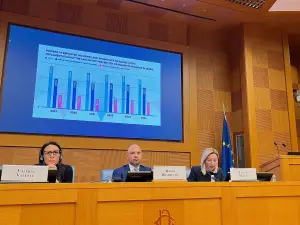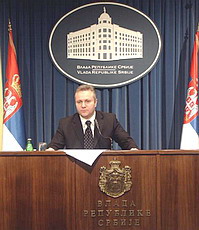- Serbia
Get to know Serbia
- Citizens
Culture and science
Health services
Pension and disability insurance
- Business
Employment
Economy
- Media
- Government
- Contact
Keep in touch
Contact form
Back
Keepin touch
Whether you have a question, comment, suggestion or any problem in the purview of the government, send us your message and we will try to respond as soon as possible. If your problem is not in our purview, we will forward your message to the relevant institution.
Q:
A:
Dinkic presents Serbian government’s economic policy
Belgrade,
17 January 2005
Serbian Minister of Finance Mladjan Dinkic presented today the Serbian government’s results in 2004 and economic policy for 2005 to diplomatic representatives from several developed countries as well as EU members.
Dinkic pointed out that economic growth in 2004 amounted to over 8 percent, which was the highest level in Serbia over the past 25 years. The budgetary deficit in 2004 was half that of the year before, amounting to 1.7 percent of GDP, he said. He recalled that Serbia received an international credit rating in 2004, which should result in a reduction of credit rates offered to corporate clients and citizens.
The finance minister said that our country renewed an arrangement with the International Monetary Fund (IMF) and the World Bank, adding that an additional $700 million of debt write-off to the Paris Club is expected this year in a move that will reduce public debt to 49 percent of GDP.
Presenting tax relief programmes, Dinkic pointed out that as of January 1, all new workers have been relieved of the 14 percent income tax. Those with the initiative to run their own business will be able to take loans from the Crediting Fund, which will provide funds amounting to 600 million dinars for micro-loans.
He said that the 10 percent corporate profit tax in Serbia is the lowest in Europe, and went on to say that the introduction of the value-added tax (VAT) and other measures this year will reduce the level of grey economy from the current 35 percent to below 20 percent.
The meeting with the finance minister was attended by over 60 ambassadors and economic advisors from developed countries as well as members of the EU, who expressed a high level of interest in the government’s employment measures.
The finance minister said that our country renewed an arrangement with the International Monetary Fund (IMF) and the World Bank, adding that an additional $700 million of debt write-off to the Paris Club is expected this year in a move that will reduce public debt to 49 percent of GDP.
Presenting tax relief programmes, Dinkic pointed out that as of January 1, all new workers have been relieved of the 14 percent income tax. Those with the initiative to run their own business will be able to take loans from the Crediting Fund, which will provide funds amounting to 600 million dinars for micro-loans.
He said that the 10 percent corporate profit tax in Serbia is the lowest in Europe, and went on to say that the introduction of the value-added tax (VAT) and other measures this year will reduce the level of grey economy from the current 35 percent to below 20 percent.
The meeting with the finance minister was attended by over 60 ambassadors and economic advisors from developed countries as well as members of the EU, who expressed a high level of interest in the government’s employment measures.
-
 Belgrade, 21 November 2025
Belgrade, 21 November 2025Joint commitment to strengthen bilateral ties between Serbia, Botswana
-
 Belgrade/Rome, 21 November 2025
Belgrade/Rome, 21 November 2025Serbian government’s strong commitment to combating violence against women
-
 Belgrade, 18 November 2025
Belgrade, 18 November 2025Serbia remains committed to open dialogue, cooperation with OSCE
-
 Belgrade, 18 November 2025
Belgrade, 18 November 2025Cooperation with WHO to strengthen protection for victims of violence
-
 Belgrade, 18 November 2025
Belgrade, 18 November 2025Germany ready to accompany Serbia on its path towards EU
-
 Belgrade, 16 November 2025
Belgrade, 16 November 2025Solution for NIS must be found by next week
-
 Belgrade, 15 November 2025
Belgrade, 15 November 2025United States sends request for Russian ownership to exit NIS
-
 Belgrade, 13 November 2025
Belgrade, 13 November 2025Serbia continues to be reliable partner of EU
-
 Belgrade, 13 November 2025
Belgrade, 13 November 2025European integration, preserving peace, stability priorities for Serbia
-
 Belgrade, 13 November 2025
Belgrade, 13 November 2025Cooperation agreement signed for preparation of Specialised Expo 2027

